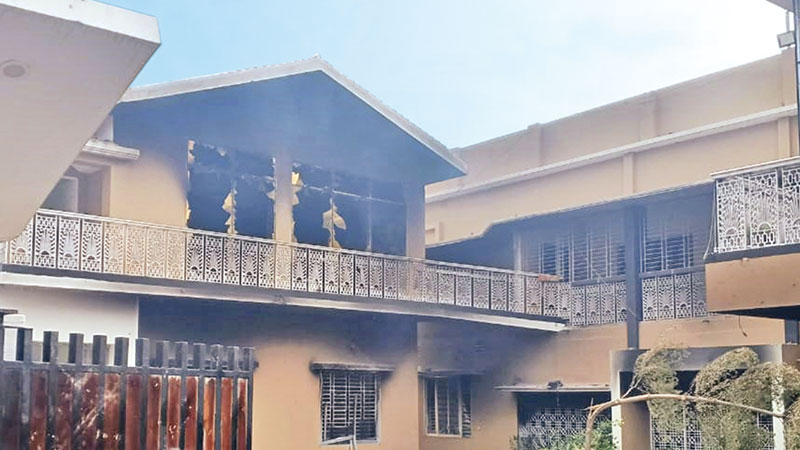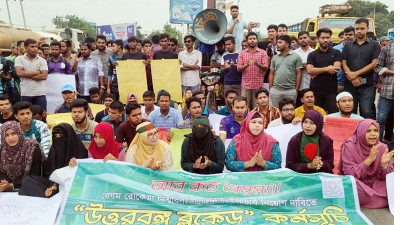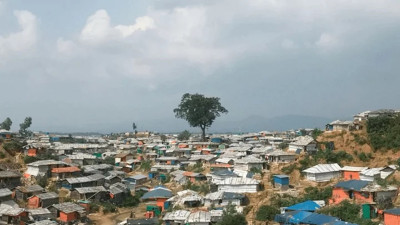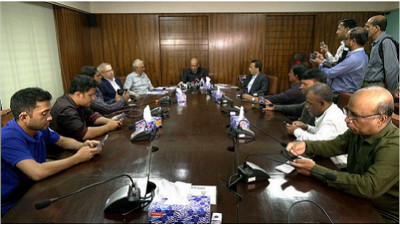 Former Member of Parliament Sheikh Helal Uddin once lived in this house on Sher-e-Bangla Road in Khulna. (File photo/Staff Photographer)
Former Member of Parliament Sheikh Helal Uddin once lived in this house on Sher-e-Bangla Road in Khulna. (File photo/Staff Photographer) They
were in power for over a decade and a half. During this time, their wealth grew
at an incredible pace and scale. Nearly all influential leaders of the Awami
League resided in palatial and luxurious houses like fairy tales. These houses
became the focal point of political activities. While the Awami League held
power, these houses were regularly filled with party leaders and activists. Day
and night, they buzzed with activity, with no shortage of security. But after
the party’s fall from power, most heavyweight leaders went into hiding. Some
were arrested by law enforcement in connection with various cases. Their once
lavish houses are now empty and deserted.
Among
the prominent regional leaders of the Awami League is Nizam Uddin Hazari of
Feni. The district’s Awami League General Secretary and former Member of
Parliament for the Sadar constituency built a grand mansion in the Masterpara
area of the city. There are rumors that the construction cost more than BDT 10
billion. The house is surrounded by a lake, with a helipad, swimming pool, and
other lavish amenities. From this mansion, Nizam Hazari controlled the politics
of Feni. Due to the regular visits of central Awami League leaders and local
activists, the house became well-known. However, due to strict security
measures, the public was not allowed to enter.
On
the day the Awami League fell from power, Nizam Hazari was staying at this
house. After rumors spread that Sheikh Hasina had fled, he left the house. That
day, as part of protests that spread nationwide, the mansion was heavily
attacked and vandalized. Many items inside were looted. The luxurious house was
reduced to rubble. The house still remains in that state.
Another
well-known local heavyweight of the Awami League is Ekramul Karim Chowdhury,
former General Secretary of the Noakhali District Awami League and ex-Member of
Parliament for the Noakhali-4 (Sadar-Subarnachar) constituency. Using his
influence, he secured victories for his wife and son in the Upazila Parishad
elections. His wife was the Chairman of Kabirhat Upazila Parishad, and his son,
Sabab Chowdhury, was the Chairman of Subarnachar Upazila Parishad. Besides his
residence in the district town, he built a lavish home in his native village of
Sundalpur in Kabirhat Upazila. Though located in the village, the large
one-story house features a helipad in front and a large pond within the
property. There is also an orchard behind the house with various fruit and
timber trees.
As
the District General Secretary of the Awami League, Ekram Chowdhury’s village home
was a frequent gathering place for Awami League leaders and activists.
Additionally, due to his wife and son’s positions as Upazila Chairmen, ordinary
people also frequented the house. As a result, the home was always bustling
with activity day and night. This continued until the fall of the government.
Though the crowds dwindled after the government collapsed, Ekram Chowdhury
remained at the village house with a few supporters. However, there was no
attack on the house. On August 11, he left the house with his family. The
lavish home now stands empty and deserted.
Salman
Fazlur Rahman, former Adviser to Prime Minister Sheikh Hasina on private
industry and investment and former Member of Parliament for Dhaka-1
constituency, resided in a house on Road 71, House 1 in Gulshan-2, an area
known for its diplomatic enclaves. The house was regularly visited by top
political and business leaders, as well as foreign diplomats. The three-story
house in Gulshan was one of the most luxurious in Dhaka, with stringent
security measures. Now, the house is shrouded in silence, and a burnt smell
lingers. Shortly after Sheikh Hasina left the country, the house was looted.
Twelve cars parked in the compound and garage were set on fire. The second
floor was also set ablaze. The house now stands as a burned-out ruin.
In
Banani, the house of Sheikh Rehana, Sheikh Hasina’s sister, was attacked after
the government’s fall. This house, too, now stands empty.
Awami
League’s associate organization, Jubo League Presidium member Md. Mujibur
Rahman Chowdhury Nixon has built a luxurious house in his electoral area. The
house, located on several acres in Charchandra village of Azimnagor Union in
Bhanga, is equipped with almost every luxury. The two-story house includes a
pond, a small field, and a fruit garden. There is a separate space for meeting
with leaders, activists, and locals. When Nixon had programs in his electoral
area, he would stay there, and his supporters would gather at the house.
However, in Nixon’s absence, public access to the house was limited. After the
fall of the government, the house has become completely deserted.
Former
MP of Natore-2 constituency and ex-general secretary of the district Awami
League, Shafiqul Islam Shimul, has faced criticism for acquiring wealth beyond
his known income. Shimul built a luxurious ‘Jannati Palace’ in the Kandivita
neighborhood of Natore city. The house, surrounded by high walls and equipped
with modern amenities, was monitored by CCTV cameras. For a significant part of
the Awami League’s tenure, this house was the control center for contract work,
business, and sports activities in Natore. Even the divided Awami League, its
associate organizations, and professional groups in Natore operated under
Shimul’s supporters from this location. As a result, ‘Jannati Palace’ became a
prominent name in Natore politics.
After
the government fell, the house faced widespread attacks, looting, and arson. No
relatives of Shimul were present in the house during Sheikh Hasina’s fall from
power. After the news of the government’s collapse spread, even the employees
left the house. Locals said that his family members live in Canada. When Shimul
stayed in Natore, he resided in this house, and his relatives took care of him.
At that time, people from various walks of life would visit the house until
late at night. Now, the house is abandoned and deserted.
Regarding
this, Badiul Alam Majumdar, Secretary of Citizens for Good Governance (SHUJAN),
said, “To my knowledge, there is no precedent of a government or head of state
fleeing in this manner after a fall. Not only that, but the leaders and
activists of that party are also on the run. After building mountains of wealth
over so many years, they cannot enjoy them now. They cannot even live in their
houses. This tragic outcome is due to their establishment of an authoritarian
regime. Only democratic practices and the people’s trust can save future
governments from such a fate.”
During
the Awami League’s rule, the ‘Sheikh Bari’ house on Sher-e-Bangla Road in Khulna
became the ‘center of power’. The luxurious two-story house, inherited through
family, was owned by Sheikh Hasina’s cousin, former MP of Bagerhat-1 Sheikh
Helal Uddin, former MP of Khulna-2 Sheikh Salah Uddin Jewel, Jubo League
Presidium member Sheikh Sohel, Sheikh Rubel, and Sheikh Babu. On the day of the
government’s fall, the house was repeatedly vandalized, set on fire, and
looted. The house is now a pile of rubble.
Former
MP Sheikh Helal Uddin resided in Dhaka. His brother, MP Sheikh Salah Uddin Jewel,
Jubo League Presidium member Sheikh Sohel, Sheikh Rubel, and Sheikh Babu would
alternate between staying in Dhaka and Khulna. When they were in Khulna, the
house would be crowded with people from different professions and backgrounds
until late at night. Now, the house is completely abandoned.
After
the fall of the government, Awami League leaders and activists at all levels
are in hiding. Most leaders are absent from their homes in Dhaka and elsewhere.
Sheikh Hasina’s uncle, Amir Hossain Amu’s house in Eskaton, Dhaka, as well as
his house on Rollace Road in Jhalakathi city are also empty. Additionally, the
residence of former Whip Iqbalur Rahim near the Sadar Hospital in Dinajpur has
turned into ruins.
Iftekharuzzaman,
Executive Director of Transparency International Bangladesh (TIB), said, “The
rise of authoritarianism is due to the absence of transparent, accountable, and
democratic governance. Those who were directly or indirectly involved in
building this system had to flee as soon as the government fell. Many have left
their homes. No one is staying in those houses now. Furthermore, many of them
have laundered large amounts of wealth abroad. The money laundered from
Bangladesh can be recovered under the country’s existing laws and international
conventions. To achieve this, the Bangladeshi government must establish legal
agreements with the governments of the destination countries.”






